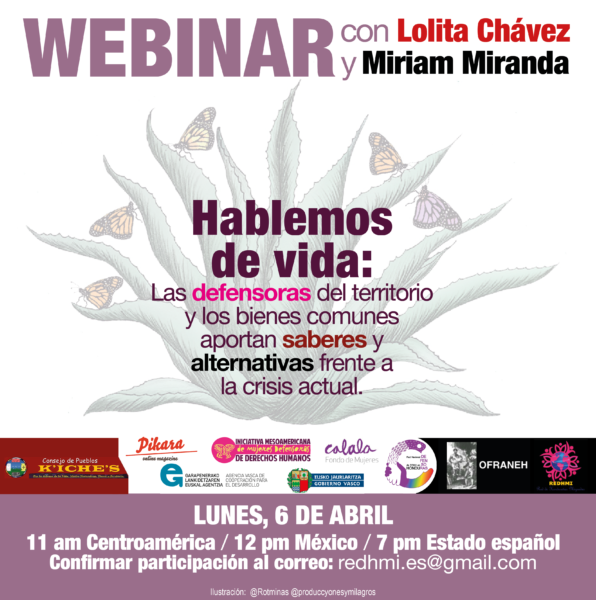On April 11, the Peace Brigades International-Guatemala Project posted on its Facebook page an IM-Defensoras media release about a virtual meeting of women human rights defenders that took place on Monday, April 6.
Lolita Chávez of the TZ’KAT Network of Ancestral Healers of Community Feminism from Ixmulew took part in the webinar. PBI-Guatemala has accompanied the TZ’KAT network since February 2018.
The IM-Defensoras media release highlighted, “The webinar, called ‘Let’s talk about life: the defenders of the territory and common goods contribute knowledge and alternatives to the current crisis’ virtually brought together defenders based in Central America, South America, Mexico, the Spanish State, and South Africa.”
“Lolita Chávez started the conversation by pointing out the importance of speaking, of not remaining silent. ‘We are peoples of love, we generate a lot of creativity … It is important that the conocimiento arise and communicate. We must say what we are doing in the territories, silences are convenient for the powers.’”
“And as Lolita says those European companies have not stopped, extractivist and water pollution continue. Women human rights defenders challenge western cultures to respect, listen and apprehend their knowledge to save lives, territories, affections, networks, wisdom.”
“In the words of the Mayan sisters: TZK’AT: what it is I take care of you and you take care of me, we take care of ourselves, healing you I heal, you support me and I support you, it is reciprocity but not only between humans but with the Mother Land.”
“The meeting discussed the risk that the capitalist, racist and patriarchal response that is taking place to this crisis means for women and peoples and emphasized the urgency of the feminist, community organization, from and in the territories, to cope with the crisis.”
“The event was organized by the K’iche’s Peoples Council, Calala Women’s Fund, Píkara Magazine, the Basque Agency for Development Cooperation, the National Network of Human Rights Defenders in Honduras, the Honduran Black Fraternal Organization (Ofraneh), the IM-Defensoras and the Network of Honduran Migrants.”
To read the full media release, please click here. Information about the webinar, in which 369 people participated, is also posted here.


